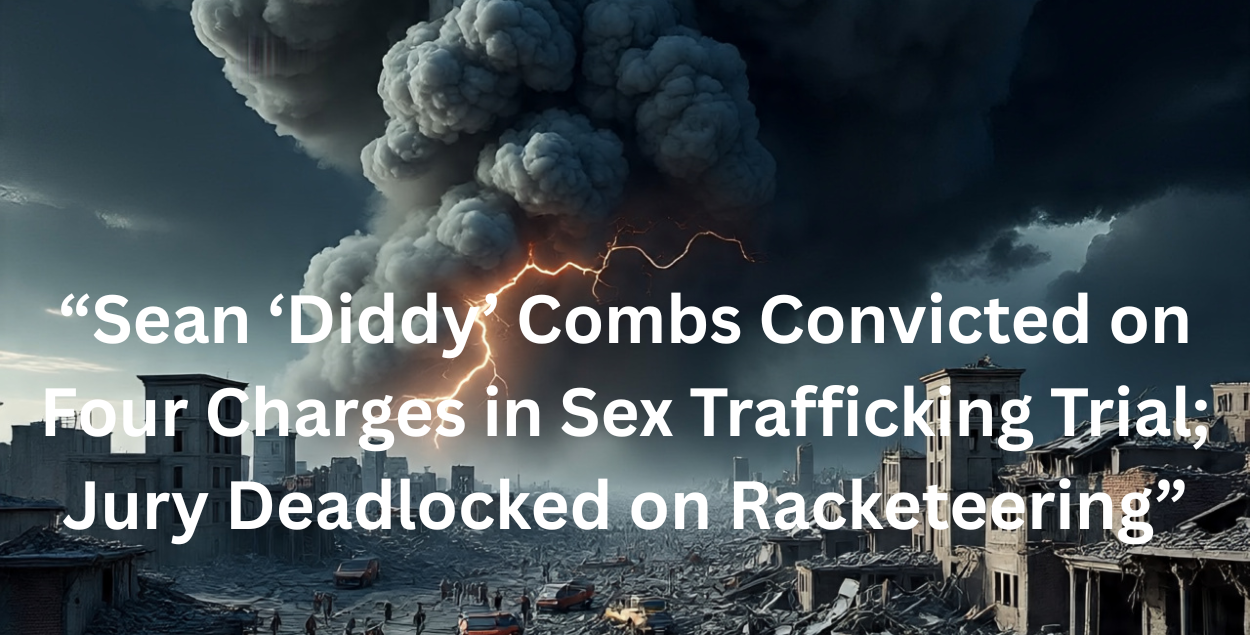FnF News
Diddy Trial Shakes Legal and Cultural Foundations: Guilty on Four Counts, Jury Divided on Criminal Conspiracy
By Khadija Khan | FNF News | July 2, 2025
New York City — In a moment that stunned both court observers and millions watching live coverage, the jury in Sean “Diddy” Combs’ high-profile federal trial delivered a partial verdict, convicting the music mogul on four major charges related to sex trafficking and prostitution while failing to reach consensus on the central count of racketeering conspiracy.
After nearly two weeks of tense deliberations following a month-long trial, the panel reached unanimous verdicts on multiple charges—but remained deadlocked on whether Combs led a criminal enterprise under the federal RICO statute, a decision with life-altering consequences.
The Verdict So Far: Guilty on Four Felony Counts
According to reports from CBS, NBC, and People Magazine, the jury convicted Combs on two counts of sex trafficking and two counts of transportation for prostitution, both involving high-profile accuser Cassie Ventura and another woman identified in court only as “Jane.” These charges carry potential decades-long prison sentences.
During the trial, Cassie Ventura’s powerful testimony described a pattern of psychological control, coercion, and physical abuse, including an incident at the InterContinental Hotel captured on surveillance video. Her account, corroborated by text messages and witness testimony, formed the backbone of the prosecution’s case.
Racketeering Conspiracy: The Charge That Divides the Jury
The unresolved fifth charge—racketeering conspiracy under the RICO Act—is by far the most severe, carrying a maximum sentence of life in federal prison. Prosecutors argued that Combs operated a shadow network of enablers, including security staff, personal assistants, and entertainment executives, to entrap and exploit young women for sex, power, and profit.
But jurors remain split. According to a note submitted to the judge, some members of the jury were “unpersuadable” on key legal standards, prompting federal judge Arun Subramanian to send them back for further deliberation with a firm reminder to weigh the full body of evidence.
Defense and Prosecution React to Split Decision
Combs’ defense team immediately seized on the jury’s indecision, calling the split a “testament to the weaknesses in the government’s broadest accusation.” In contrast, prosecutors maintained that the four guilty verdicts confirm a pattern of predatory behavior that should not be minimized.
Outside the courtroom, victims’ advocates and legal analysts expressed measured optimism. “This isn’t just a celebrity story,” said one attorney for the National Sexual Violence Resource Center. “This is a landmark moment in holding the powerful to account in an era that too often looks the other way.”
Cultural Shockwaves: From Industry Icon to Convicted Felon
Sean Combs, once revered as a defining figure in American hip-hop, fashion, and media entrepreneurship, is now a convicted felon facing a grim sentencing phase. His label, Bad Boy Records, has reportedly suspended all business operations, and corporate partnerships—once worth hundreds of millions—have quietly been severed.
The trial has sparked widespread conversation about celebrity power, abuse of influence, and how long the music industry enabled such behavior unchecked. On social media, hashtags like #DiddyVerdict and #JusticeForCassie are trending globally.
What Comes Next: Sentencing, Retrial, or Mistrial?
The court will resume deliberations on the racketeering charge Wednesday. If jurors fail to reach consensus, the judge may declare a mistrial on that count alone, leaving prosecutors to decide whether to retry it separately.
Meanwhile, sentencing on the four guilty charges is expected within 90 days unless delayed by appeals or motions. Combs could face up to 65 years in prison based on mandatory minimums and federal sentencing guidelines.
FNF News Perspective
This is no ordinary case. It is a collision of celebrity, systemic silence, and legal accountability. Whether or not the final charge results in conviction, the four guilty verdicts send an unmistakable message: power no longer guarantees protection. As courts, culture, and conscience realign, this trial may mark a turning point for how America responds to abuse—even when the abuser built an empire on beats and branding.

